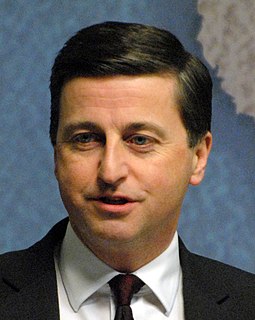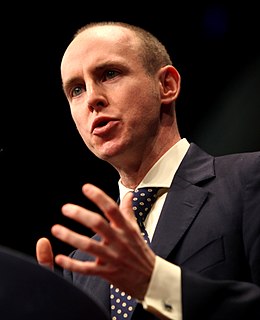A Quote by Ian Mcewan
He never believed in fate or providence, or the future being made by someone in the sky. Instead, at every instant, a trillion trillion possible futures; the pickiness of pure chance and physical laws seemed like freedom from the scheming of a gloomy god.
Related Quotes
James often wondered at the chain of flukes it must have taken to bring him through with his own life and limbs intact. Once he might have believed it to be the work of Providence but it seemed to him now that to thank God for his life would be to suggest God had shrugged off all the others flicked them away like cigarette butts by the thousands and that seemed like abominable conceit. James Dorsey took no credit for being alive. His higher power these days was Chance.
Analysis of President Bush's tax plan has revealed that several elaborate tricks and gimmicks were used to make it look like a $1.35 trillion cut, but in reality it's going to be closer to costing $1.8 trillion. Critics claim it's math so fuzzy, you have to squint to see our nation's future of subsistence farming and post-apocalyptic roving motorcycle gangs.
And people really behaved in a fraudulent way or something, we'll go back and find the culprits later on. But that really isn't the problem we have. I mean that's where it came from, though. We leveraged up and if you have a 20 percent fall in value of a $20 trillion asset, that's $4 trillion. And when $4 trillion lands - losses land in the wrong part of this economy, it can gum up the whole place.
The problem is that the way [President] Bush has done it over the last eight years is to take out a credit card from the Bank of China in the name of our children, driving up our national debt from $5 trillion dollars for the first 42 presidents - number 43 added $4 trillion dollars by his lonesome - so that we now have over $9 trillion dollars of debt that we are going to have to pay back. [That's] $30,000 for every man, woman and child. That's irresponsible. It's unpatriotic.
We paid for this instead of a generation of health insurance, or an alternative energy grid, or a brand-new system of roads and highways. With the $13-plus trillion we are estimated to ultimately spend on the bailouts, we could not only have bought and paid off every single sub-prime mortgage in the country (that would only have cost $1.4 trillion), we could have paid off every remaining mortgage of any kind in this country - and still have had enough money left over to buy a new house for every American who does not already have one.





































